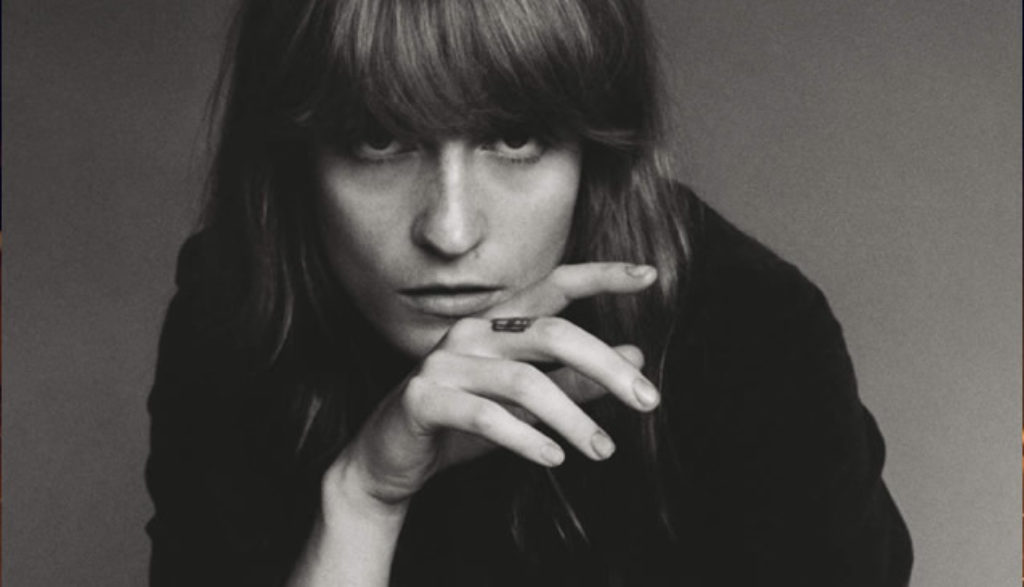
How Big, How Blue, How Beautiful, the title of Florence + The Machine’s third studio album, initially evokes feelings of awe and wonder. But the lyrics of the album’s 11 songs—in which Florence Welch seemingly emerges as Eurythmics singer Annie Lennox’s long-lost little sister—rarely tread upon such upbeat thematic paths. Instead, Florence and her bandmates mostly tumble down a rabbit hole of inky, swirling melancholy as song after song vainly tries to piece together the jagged shards of a shattered romance.
On “Various Storms & Saints,” Welch says, “I am teaching myself how to be free,” and hints at the need for self-forgiveness (“If you could just forgive yourself/But still you stumble, feet give way”). She sings (apparently to herself), “I know you’re bleeding, but you’ll be OK/Hold on to your heart, you’ll keep it safe.” Such self-instruction also includes this optimistic message: “I know it seems like forever/ … But one day this will be over.” “Ship to Wreck” proclaims, “Don’t touch the sleeping pills, they mess with my head.”
“Long & Lost” asks, “You wonder why it is that I came home,” then answers, “I figured out where I belong.” “Caught” alludes to Lot’s wife (in Genesis 19) as Welch looks back at a relationship she knows she must relinquish: “You turn to salt as I turned around to look at you/Old friends have said, the books I’ve read/Say it’s the thing to do/But it’s hard to see when you’re in it.” Welch says of loss and its disorienting aftereffects, “And I’m learning, so I’m leaving/And even though I’m grieving/I’m trying to find the meaning/Let loss reveal it.”
“Third Eye” admonishes, “You don’t have to be a ghost/Here amongst the living/You are flesh and blood/And you deserve to be loved and you deserve what you are given.” Later, she pleads with someone who’s leaving her, “I’m trying to change.”
“Ship to Wreck” tries to determine what it was that drove a man away (“And, oh, my love, remind me what was it that I did?/Did I drink too much?”). Welch says profanely of her doomed love affair, “And good god, under starry skies we are lost/ … And the water’s coming in fast.” “Queen of Peace” bails emotional water, too, with Welch saying of a broken relationship, “Suddenly I’m overcome/ … Like a boat into oblivion/ … Like a long scream/Out there, always echoing/Oh, what is it worth?/All that’s left is hurt.”
Likewise, the deeply sad “What Kind of Man” finds Welch’s jilted protagonist confessing she had to be inebriated just to cope with her long-term, emotionally abusive relationship. “I already had a sip/So I’d reasoned I was drunk enough to deal with it.” The “it” in question is a multi-decade romance with a man who could never fully commit: “Like always, you could never make up your mind/And with one kiss/You inspired a fire of devotion/that lasted 20 years.” She then wonders, “What kind of man loves like this/To let me dangle at a cruel angle.” Still, she can’t quite quit him: “You do such damage/How do you manage?/Tryna crawl back in for more/ … ‘Cause I’m still with you.”
An unsettling reference to Christianity pops up when Welch sings on the title track, “Between a crucifix and the Hollywood sign, we decided to get hurt.” And the song ends with a nod toward something that sounds like reincarnation (“Maybe I’ll see you in another life/If this one wasn’t enough”). Yet another spiritually jumbled song, “Delilah,” has Welch comparing herself to Samson: “As I pull the pillars down/It’s a different kind of danger/ … Never knew I was a dancer/’Til Delilah showed me how/ … These chains never leave me/I keep dragging them around.” Elsewhere on this song she says cynically of romance in general, “Now it’s one more boy, and it’s one more lie.”
Still more spiritual allusions (from multiple sources) turn up on the last several tracks. “Caught” proffers an ominous reference to the Greek goddess of the underworld (“Persephone will have her fill”). “Third Eye” references that Eastern/New Age spiritual tenet (“‘Cause there’s a hole where your heart lies/And I can see it with my third eye”). “St. Jude” characterizes its titular saint as a woman who brings destruction (“St. Jude, somehow she knew/And she came to give her blessing while causing devastation”). Album closer “Mother” starts off with an odd prayer (“Oh Lord, won’t you leave me/Leave me on my knees/’Cause I belong to the ground now”) that morphs into another supplication, apparently to Mother Nature, to become a tree (“Mother, make me/Make me a big tall tree/So I can shed my leaves and let it blow through me”). The balance of the song finds Welch praying to be other natural things as well (“a big gray cloud,” “a bird of prey”), concluding with, “Heaven trembles, fallen at our feet.”
Life and love and the loss of the latter can be utterly bewildering. That sentiment saturates How Big, How Blue, How Beautiful: A broken romantic relationship is Florence Welch’s sole focus here. The result is an album that feels heavy even in moments when glimpses of hopeful perspective poke pinholes of light in the perpetual emotional fog Welch wades through on every track.
That leaves us with a mournful sense of futility and unresolvable disorientation—not to mention a confusing mélange of spiritual influences. It’s as if this album-length narrative asks us to swim alongside Welch through a great, roiling, dark ocean. We watch her barely crane her neck above the waves every now and then. And we begin to wonder if we’ll be able to do the same.


After serving as an associate editor at NavPress’ Discipleship Journal and consulting editor for Current Thoughts and Trends, Adam now oversees the editing and publishing of Plugged In’s reviews as the site’s director. He and his wife, Jennifer, have three children. In their free time, the Holzes enjoy playing games, a variety of musical instruments, swimming and … watching movies.